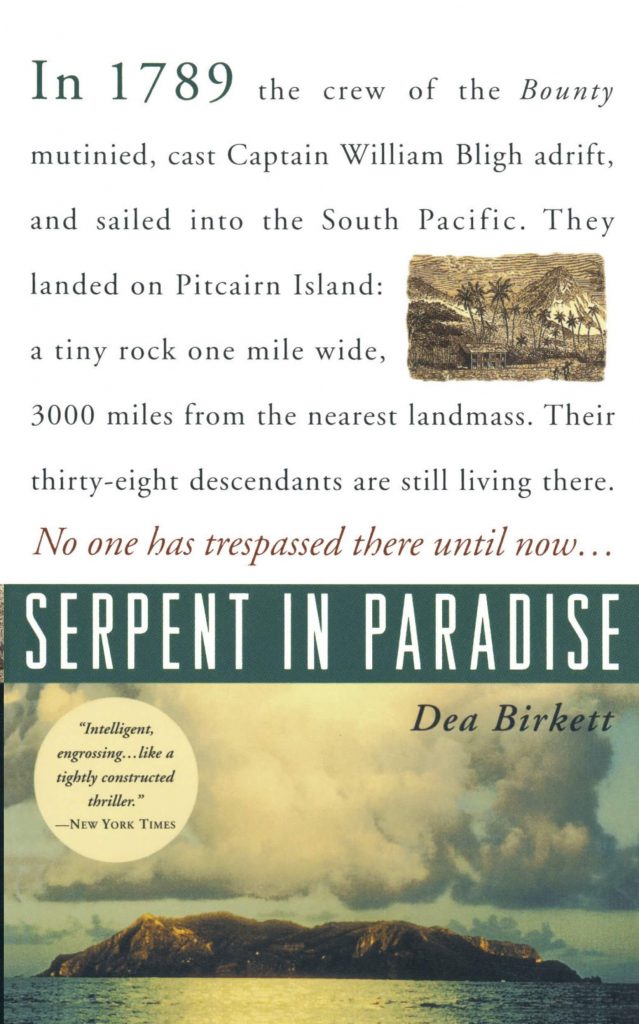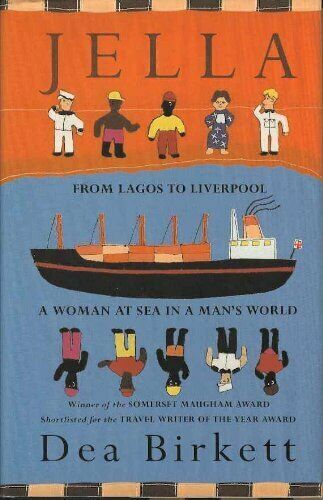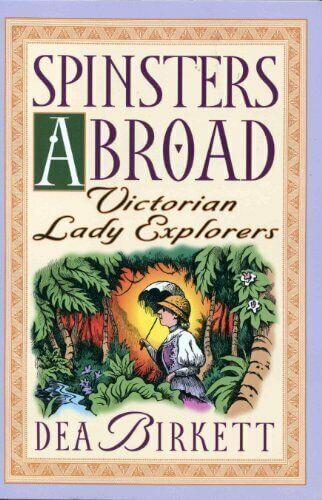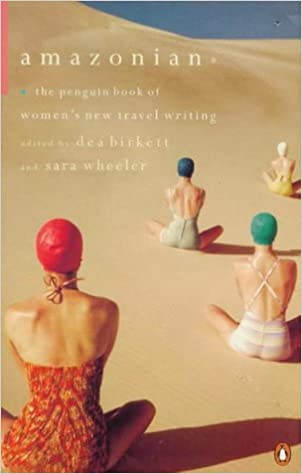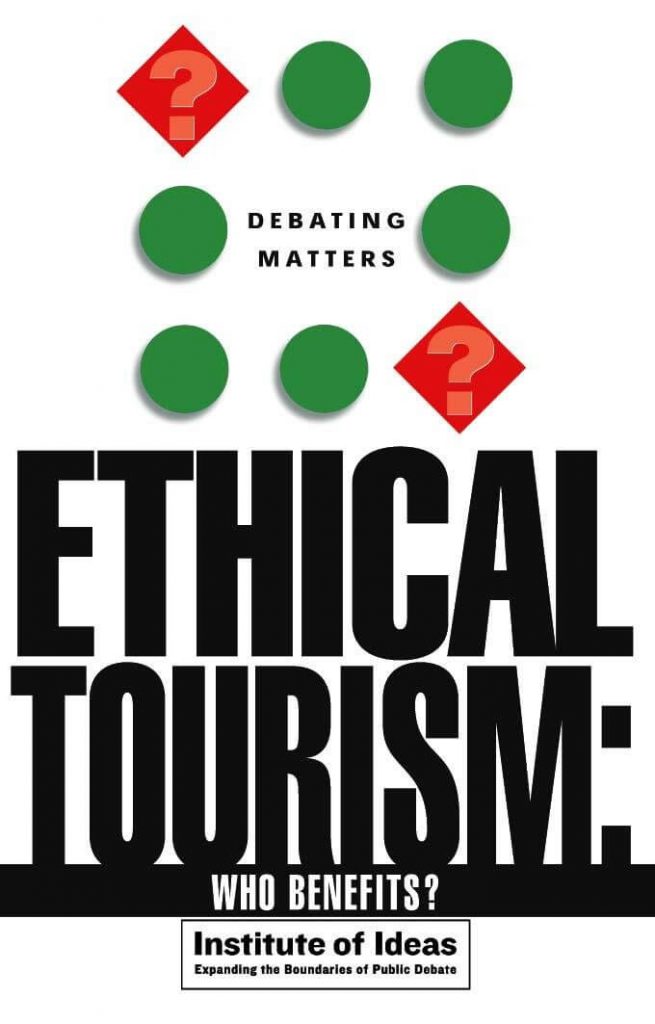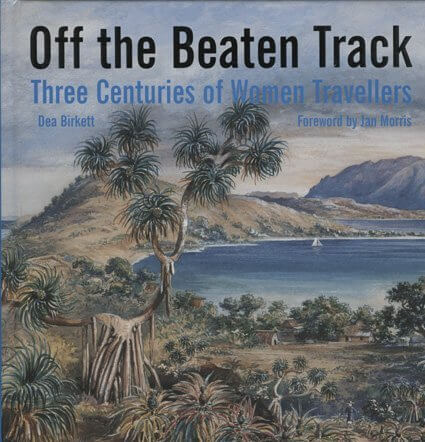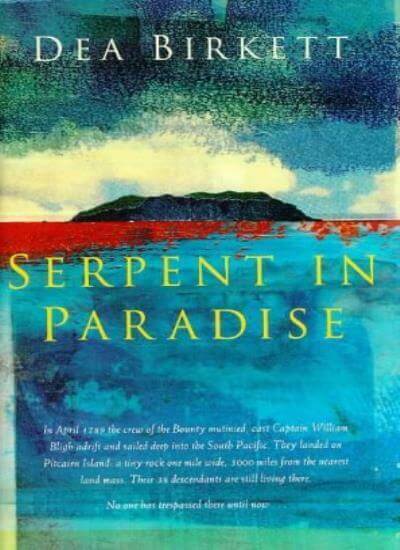
Writing
“I can’t remember a day when I haven’t put words on a page. It’s the simplest form of storytelling, needing nothing more than pencil and paper. Even so, it’s terrifying. It wouldn’t be so good to do if it weren’t.”
Dea Birkett
“My books are travel writing with very little movement. I don’t draw long red lines across continents. I’m interested in travelling communities that go nowhere – the crew on a cargo ship, the performers in a circus, and the few remaining inhabitants of Pitcairn Island in the South Pacific. The surrounding landscape may change, but the people remain the same. It’s the same cast of characters from the beginning to the end of my journey.”
More Dea on islands
Fool’s paradise
First published in The Spectator on 22 June, 2019
Islands have a special appeal. We imagine that on an island we’ll somehow ‘get away from it all’. In the era of Brexit and climate concerns, Pitcairn Island in the Pacific, more than 3,000 miles from the nearest landmass, is flooded with requests from people hoping to settle there. I would advise them to think again. […]
Island of Lost Girls
First published in The New York Times on 29 October, 2004
If there’s a Paradise, it should be Pitcairn Island. The island, a mile-by-mile-and-a-half crag of dark volcanic rock marooned in the middle of the South Pacific, is home to just 47 people, mostly descendants of the famed mutineers from the British ship Bounty. The islanders pass their days hoeing peppers and sweet potatoes, fishing for shark from flat-bottomed canoes, and shooting down breadfruit from the trees with their muskets. […]
ST Travel meets… author, journalist and circus enthusiast Dea Birkett
In our new series of exclusive online interviews, we meet the woman who followed the Victorian female travellers’ journeys through West Africa
First published in The Sunday Times on 5 May, 2019
My love of travel began with Victorian women travellers such as Mary Kingsley and Isabella Bird. As a student, I read all their books about tramping across the world, conquering deserts and mountains — often on their own.
I longed to leave my boring suburban life and head for the unknown. So I followed Mary Kingsley’s route through West Africa when I was in my twenties, using her book Travels in West Africa, published in 1897, as my guide. I tried to find the world she had inhabited.
My journey began in Cameroon, ended in Nigeria and took six months. […]
The great escape
In the past, women travelled to lose themselves, while men preferred to climb and conquer. So, asks Dea Birkett, has anything changed?
First published in The Guardian – Gender on 5 July, 2004
At a recent talk I gave about my travels, the male organiser pinned a map of the world on the wall behind me, and handed me a pen. He asked me to trace a red line to demonstrate the routes I had travelled for the benefit of the audience. I made a feeble dot. I hadn’t really travelled anywhere at all, not in that sense. I don’t go on expeditions. The only journey I had taken was to get there; once I had arrived, I had stayed.
The Victorian lady traveller Mary Kingsley would have understood. Like many women, she refused to reveal that she had travelled only 70 miles inland, a trek of a few days, in her bestselling book Travels in West Africa, published in 1897. She feared that the lack of a long red line across the map would diminish her reputation. She might have compared herself to her contemporary Paul Du Chaillu, who boasted of having made an 8,000-mile journey through the same area, in the course of which he shot 2,000 birds, 1,000 quadrupeds, and suffered 50 attacks of fever. Kingsley fell sick once. […]
From 2012 to 2016, Dea was Royal Literary Fund Fellow, University of Brighton, UK. In 2013 she was elected a Fellow of the Royal Literary Society. She is a board member of the Heinrich Boll Festival, held on Achill Island, Co Mayo, Ireland each May.
Journalism
The important bits from the last two decades:
Gypsies, Roma and Travellers are one of the last people who can be openly vilified
First published in The Guardian on 15 January, 2002
School for scandal
You can see the newly painted bright yellow school as soon as you come over the crest of the hill. It stands out proud against the deep, dank green of the sodden fields and flinty grey of the dry-stone dykes. Outside, a handful of children are playing. When Brid Connolly started teaching at St Joseph’s in Ballinruane, County Galway 35 years ago, there were 82 pupils. The numbers have been dwindling ever since. Last September there were just a dozen pupils left, taught by Connolly and one other teacher in two cavernous rooms. The village’s tiny school was under threat of closure. Then the Wards, a family of Irish Travellers, halted their caravans and sent their five children to Connolly. It seemed like a blessing: with five new pupils, St Joseph’s would be saved. […]
On travel
The – very grand – mother of inoculation
First published in The Oldie on 10 April, 2020
We all want antibodies. But who discovered they could be used to fight infection?
Not, as you might think, physician Edward Jenner but an eccentric, early 18th-century aristocratic lady.
While hanging out in the harems of Constantinople, traveller and woman of letters Lady Mary Wortley Montagu witnessed Turkish mothers scratching children’s arms and inserting pus from an infected blister. […]
What makes a holiday green?
First published in E&T Magazine on 11 July, 2011
Once we went on holiday to become brown. Now we go to be green. Increasingly, tour companies are claiming not only to offer us a good time, but to make us good people. From a weekend away in a two-room bed and breakfast to a fortnight at a sprawling international resort, holiday websites list ways in which they’ll guarantee our trips are sustainable and low-impact. But what counts as a ‘green’ holiday? What are the real benefits of ‘eco’ travel? And is technology a help or hindrance in turning our vacations into ethical outings? […]
Dea’s latest journey is going nowhere
First published in The Spectator on 2 August, 2020
How to travel in the captivity of your home
We can’t travel with ease anywhere, anymore. First it was Spain, now Luxembourg is the latest holiday spot to require a two-week quarantine on return. But there is one destination that is guaranteed to be hassle as well as quarantine free: your home.
If you’re wondering how you can make your 15-foot square lounge the border of your annual vacation, there’s a guidebook to help. It was written in 1790 by young Frenchman and amateur hot-air balloonist Xavier de Maistre. Maistre had been condemned to 42 days confinement in his Turin studio flat for taking part in an illegal duel. Rather than sit on his sofa and mope, he took up his pen and wrote A Journey around My Room, a manifesto on how to travel while going nowhere. It became a cult classic, influenced many writers including Victor Hugo and Marcel Proust, and is still in print over two centuries later. […]
On family and parenting
Why can’t theatre imagine what it’s really like to be the parent of a disabled child?
First published in The Guardian on 26 February, 2015
It’s rare to have your life portrayed anywhere, especially in a play. I’m a parent of a child with a disability. I’m not in children’s storybooks or in adult films about family life. I’m the invisible parent. I’m someone no one wants to be.
And then Kill Me Now premiered this week at the Park Theatre in Finsbury Park, north London, a play by Canadian Brad Fraser, with Greg Wise playing Jake Sturdy, the father of disabled Joey. I attended a preview and was hopeful that it would reflect my experiences. Instead, it was a portrait of a thwarted, self-hating, self-destructive family who might be better off dead. […]
What’s it like to grow up with a disabled sibling?
First published in The Guardian on 30 November, 2012
Thirteen-year-old Victor remembers playing with his brother, Stanley, when they were tiny. “We used to hide under the covers and Mum used to be the Jack And The Beanstalk giant and come and find us. She used to come and say ‘Fee, fi, fo, fum…’ Stanley would hide and sort of laugh. That was good. All that stuff. Now we don’t really do anything. He doesn’t really want to. Sometimes we still do. But he doesn’t want to.”
Stanley was diagnosed as autistic when he was three and a half. Soon there was no more hiding under the covers. There was no giant. He retreated into his own world. Victor, two years younger, learned to play on his own. […]
Mothers who go to work are ‘full-time’ parents too
First published in The Guardian on 20 March, 2013
There’s a breed of women populating political debates around childcare called “full-time mothers”. I have three dependent children, so I presumed I could be counted among them. But no. I work – so apparently I’m not entitled to call myself a full-time parent. I’m a part-time parent because I leave the house at 8am. Even the Treasury briefing supporting the budget’s new childcare vouchers scheme for families where two parents work distinguished parents who “look after their children full-time” from those like me.
This is nonsense. There’s not a moment when I’m not parenting. I’m a 24/7 mother. I don’t worry about my children’s welfare every now and then. I don’t clock on to motherhood when I return in time for the Channel 4 News. If a non-working mother’s children go on a “playdate” or attend a Bongo Bongo toddlers music club, that doesn’t mean they’re part-time mothers for that afternoon. They, just like me, are ultimately responsible for their children, wherever they are. […]
See it my way
First published in The Guardian on 23 November, 2002
In February, Stanley was five years’ old. “I said to Stanley, ‘Shall we sing Happy Birthday?'” says Rosie Barnes, his mother. “And he said, ‘No, no, no.’ His grandparents were there. They’re terribly sympathetic, but they just can’t believe someone doesn’t want Happy Birthday sung to them. So I said perhaps we could whisper-sing it, as it would be quite nice. He said OK. So we all sung it in whispers, but as soon as we stopped, he shouted, ‘Noooooo!’, and came over and hit me. I think he wonders why everyone finds it so much fun.”
Rosie pauses, and looks towards Stanley. He is watching The Land Before Time VI, clasping the video case. He watches it every single day when he gets back from school, always sitting on the spot on the left-hand side of the sofa, always clasping the case. He is smiling, whooping, repeating lines from the film he knows so well, bouncing up and down on the sofa, happy. Like all parents of young children, Rosie tries to understand her son, and why singing Happy Birthday is so painful for him. “Perhaps it’s because it’s out of the routine – to suddenly have a day that’s special,” she says. “And it’s charged with emotion. It’s just too much for him. He should smile like everybody else – but he just can’t.” […]
An end to apartheid schooling
First published in The Guardian on 11 January, 2002
Jack and Chloe are going to school. They’re packing their satchels and pulling on their John Lewis uniforms. When once these children may have walked up the road to their local state primary, now they’re driving to a private pre-prep. The number of children going to “independent” schools has risen in the last year, to about 7% of the total school population, despite record fee increases outstripping inflation. The government itself predicts that the private school sector will grow steadily for the next 10 years. Already, more than half a million middle class children are opting out of the state school system.
The government response is to try to tempt them back. This week the education secretary, Estelle Morris, announced a “£100m schools for the future” scheme. One purpose of the “launchpad” schools is to encourage more professional people to put their sons’ and daughters’ names on the register. Other carrots to those opting-out middle classes, still a minority, have included city academies, city technology colleges, and specialist status schools. […]
‘We were starving him into submission to the breast’
First published in The Guardian on 16 May, 2002
It is one of the most sacrosanct slogans – Breast is Best. This heavily marketed mantra is chanted at every woman throughout her pregnancy and beyond. We are supplied with lists of benefits that our precious colostrum will bring to our babies, from reducing the risk of asthma to increasing intelligence. Challenge this dogma, and we are branded bad mothers. But breast isn’t necessarily best. Breast is a bludgeon with which we are increasingly forced into feeding our own babies in a way we don’t want.[…]
Dea’s weekly Guardian column writing as Leah Wild
First published in The Guardian on 5 July, 2000
Leah Wild’s IVF diary
Buying a baby? That’ll do nicely
I’m buying a baby on MasterCard. Well, I hope it will be a baby, but at the moment it’s only the faint blistery promise of one. I would have preferred to purchase him or her by American Express, to clock up air miles, but the hospital wouldn’t accept it. […]
On women and power
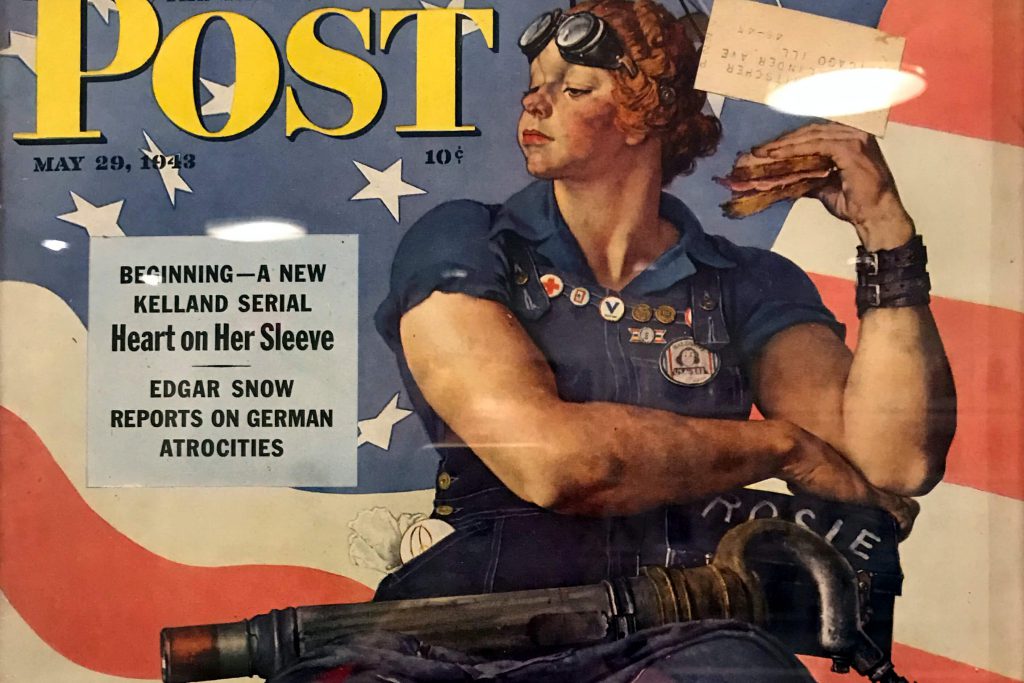
RIP Rosie the Riveter – the inspiration behind Circus250’s StrongWomen Science circus show
First published in The Oldie on 6 March, 2020
Who was Rosie the Riveter?
She’s the enduring image of powerful womanhood – eyebrows plucked, biceps bulging. A red, dotted kerchief is tied about her brushed-back hair. She’s steely and resolute, lipsticked and lovely.
Rosie the Riveter came into the world quietly. The original motivational ‘We Can Do It!’ poster, of a then unnamed Rosie, was produced for Westinghouse Electric Corporation by graphic artist J. Howard Miller and displayed in the company’s California factories for two weeks in 1943 before she was taken down.[…]
Women engineers: are more role models the answer?
First published in E&T Magazine on 21 April, 2019
One hundred years ago this year, a small committee of influential women – designers, munitions factory managers and wives of eminent engineers – gathered together to found the Women’s Engineering Society (WES). It was a time of hope. The First World War had ended and limited women’s suffrage had been won.
In the Society’s first Woman Engineer Journal, the declared aim was to “encourage and stimulate all women who are interested in engineering” and “be a means towards removing the prejudices and artificial restrictions which now prevent women from taking up engineering as a trade or profession”. (The Journal is now fully digitalised, indexed and freely available.) The women who’d gathered together on 23 June 1919 sensed a new dawn. […]
Hedy Lamarr: film star or scientist?
First published in E&T Magazine on 16 March, 2018
Known as the ‘most beautiful woman in the world’ and a Hollywood film star, she was cast by Louis B. Meyer and Cecil B DeMille. She married seven times and had even more lovers, including actor Spencer Tracy and JFK before – she insisted – he was President. Disney’s Snow White and Cat Woman were both based on her iconic dark-haired, pale-skinned look. But Hedy Lamarr (1914-2000) didn’t want to be celebrated for her acting, nor her appearance. She wanted to be called an inventor and scientist.
The reinvention of this legendary beauty is being led by Alexandra Dean, a former technology journalist for Bloomberg TV. Dean was looking for role models for women in technology and engineering when she stumbled across Lamarr’s lesser-known story. “The number of women with jobs in science, technology, engineering and math is declining, despite the fact that schools are trying to encourage more girls to join those growing fields,” says Dean. “I thought – bingo – here is the role model everyone thinks doesn’t exist. And she’s a movie star!” […]
Travel writing
To the end of the earth
First published in The Guardian on 1 February, 2003
This is the story of men who take enormous risks to save other people’s lives. You will not know any of their names. But you will know the names of almost everyone they have saved. They are the polar pilots of the Arctic, a tiny, tight band of unassuming, unafraid men who fly small planes in conditions that break all the rules. If you’re out on the Arctic ice – the wind-chill pulling the temperature down to -60C, frostbite turning your toes black and hard as metal, your life in danger – they will come to your aid. David Hempleman-Adams (the first person to reach all four Poles: North and South, geographic and magnetic), Robert Swan (the first person to walk to both Poles) and Sir Ranulph Twistleton-Wykeham-Fiennes (“the world’s greatest living explorer”, according to the Guinness Book Of Records) are among those they’ve come for. […]
In the footsteps of Little Women in Massachusetts
First published in Family Traveller on 9 January, 2020
There’s a handwritten notice in the historic home’s kitchen titled Order of Indoor Duties for Children. ‘Prompt, Cheerful, Unquestioning, Obedience. Government of Temper, Hands, and Tongue.’ I point it out to my teenage daughter Savanna, with a hopeful nod. She shrugs, turning her gaze to the table where her long-skirted, rebellious-spirited, 19th-century heroine would have sat, making golden-tinted pies.
We’re on a guided tour of Orchard House, a simple dark wooden home on a leafy road in Concord, Massachusetts, now a small commuter town less than an hour from Boston. This unassuming cottage is where Louisa May Alcott lived, wrote and set Little Women, peopling it with characters drawn from her own family – her eldest sister Anna was the character Meg March; her father Amos Bronson Alcott, the disciplinarian who had written the notice, Mr March; and Louisa herself became the feisty, free-thinking Jo March. This winter, the new film of Little Womenis released, with Emma Watson as Meg and Saoirse Ronan playing Jo. […]
A trip to India inspired by The Jungle Book
First published in Family Traveller on 31 March, 2016
Our eyes were peeled, our ears pricked, our noses twitching. We were in the heart of the jungle, looking for tracks. ‘Stop! Look!’ shouted our guide, Avijit. There’s a small pile of tiger poo. Avijit picks it up, sniffs and rolls it around in his fingers. Then he hands it to the 14-year-old twins to sniff, too. ‘A bit hard,’ he says, disappointed. ‘Not fresh. Probably about six hours old.’
We’d set off from Jamtara Wilderness Camp in Madhya Pradesh – the very heart of India – at 5.30am, before dawn. It was only a 15-minute drive from the camp to the entrance of Pench National Park, but it was bitterly cold in the open jeep. Twins River and Savanna cuddled up against each other in the back, smothered in blankets. […]
Columns
For over five years, Dea had a weekly Travelling With Kids column in The Guardian
First published in The Guardian on 15 March, 2013
Travelling With Kids
How much should other people tolerate from our kids?
Last weekend, we all trotted off to the Aztec exhibition at the Royal Academy in London’s Piccadilly (aztecs.org.uk). Ten-year-old Storme was in her element; there’s nothing she enjoys more than a bloodcurdling tale of human sacrifice, and the free children’s audio guide recited many gory tales. The twins had turned two the day before, so were perhaps a little young for such stories, but I’ve always taken them to exhibitions and been surprised how much they’ve enjoyed them. […]
She also had a monthly Global Engineer column in E&T Magazine
First published in E&T Magazine on 21 July, 2009
The Global Engineer
I’m a rare breed. Women may hold up half the Earth – as the Chinese saying goes – but in the world of business, they carry very few of the briefcases. And when it comes to travel, and in particular business travel, most people think of the umbrella-wielding, FT-reading, black suit-wearing male.
When I have half an hour to spare at the airport, I wander forlornly around the shops searching for a nice pair of strappy size five sandals among the row upon row of men’s dull loafers and brogues. Even airport Boots seems to be awash with aftershave and clippers, rather than nail files and lipstick. And WH Smith’s airport outlets are stocked with the kind of obscure magazines about cars and gadgets that you never see in a high street branch – with hardly a Marie Claire or Elle Decoration in sight.[…]
